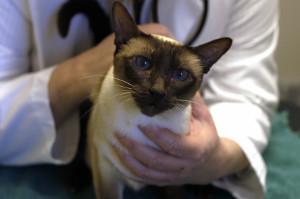 What You Need to Know about Cancer-Causing Viruses in Cats
What You Need to Know about Cancer-Causing Viruses in Cats
Viruses are everywhere and infect nearly every living species, from animal to plants. There are even viruses that infect other viruses!
Although we tend to think of viruses as causing infectious diseases like the flu, viruses also can cause cancer. It’s important to know how viruses can affect your cat, and be aware of cancer-causing feline viruses.
How Do Viruses Cause Cancer?
Viruses cause cancer by one of two general mechanisms: they can cause cancer directly because their genetic material promotes cancer growth in their host cell, or viruses can result in chronic infection and inflammation, which can promote cancer growth.
Current estimates suggest that approximately 15% of cancers in people are related to infection.
 What Viruses Can Cause Cat Cancers?
What Viruses Can Cause Cat Cancers?
Feline leukemia virus is one of the best known and well-studied cancer-causing viruses. The virus tends to cause cancers involving blood cells, such as leukemia and lymphoma. FeLV can cause cancer by directly promoting transformation of normal cells into cancerous cells, and by causing significant immunosuppression. Immunosuppression then makes a cat more vulnerable to both infections and cancer.
Feline immunodeficiency virus also causes a variety of cancers in cats. Like its human counterpart, FIV is thought to cause cancer by profound immunosuppression.
Feline papilloma virus is another virus recently identified as a cause of cat cancer, although there remains a lot to learn about this virus.
What Can I Do To Prevent My Cat From Getting Infected With A Cancer-Causing Virus?
The good news is that there are steps you can take to protect your cat.
Since the development of the first FeLV vaccine, coupled with better management measures and an increased understanding of virus transmission, global rates of FeLV-related lymphoma have decreased from 70% to 15%. Although we don’t have a vaccine against FIV, we know a lot more about how the virus behaves, resulting in better control strategies.
Viruses can be good targets for vaccines. Rabies, feline panleukopenia, and feline leukemia virus are good examples of viruses that have been successfully controlled through vaccination. Viruses give veterinarians a new target for cancer prevention.
 What Is Morris Animal Foundation Doing To Stop Cancer-Causing Viruses?
What Is Morris Animal Foundation Doing To Stop Cancer-Causing Viruses?
Morris Animal Foundation has a long history of funding innovative research in feline virology. Studies funded by the foundation led to the development of the first feline leukemia virus vaccine. The foundation has several ongoing studies specifically aimed at determining the role of viruses in cat cancers. Foundation-funded researchers at Oregon State University and Colorado State University, found three new gammaherpesviruses in cats. Gammaherpesviruses have been linked to cancers in other species, and the team is continuing their work to determine if these new viruses have a similar link in cats.
Another recently funded study is focused on examining tumor samples in FIV-positive cats for virus particles. The research team feels that if they can identify virus particles in tumors, a vaccine could then be developed against the tumor-causing viruses.
Morris Animal Foundation continues its commitment to finding new and innovative strategies to diagnose, treat and prevent cat cancer, including those caused by viruses. Learn more about our ongoing feline cancer studies, and join us in our journey to Unite to Fight Pet Cancer!




